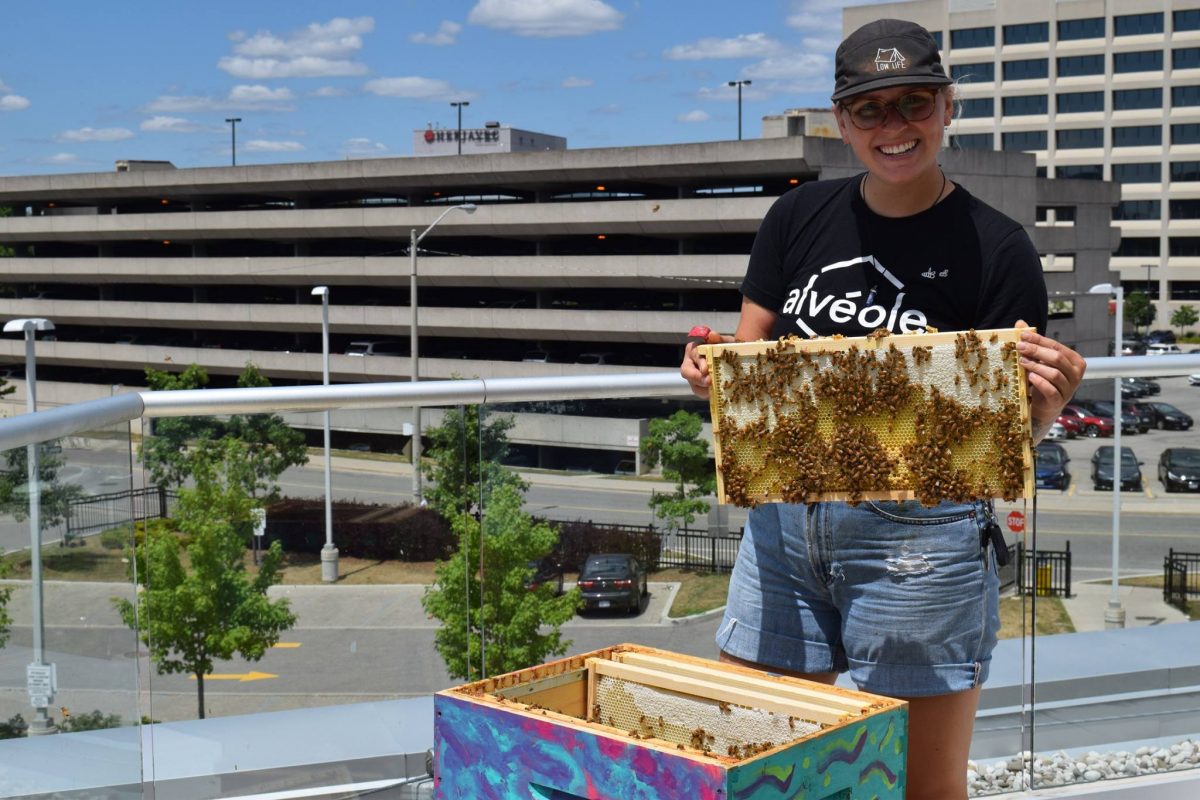Bayview Glen’s Honeybee Project
Posted: 18 May 2019

The installation of a rooftop honeybee hive has enabled Bayview Glen to support the urban bee population, whilst educating and inspiring the school community about the importance of honeybees in the ecosystem. Kristin Carpenter explains how such a project has complemented the new learning style for AP Biology and details the practical aspects of the hive’s set-up, management and promotion.
Author and position: Kristin Carpenter, Curriculum Leader, Science & Technology
School: Bayview Glen is a co-educational Day school in Toronto, Canada serving 1,047 pupils.
Introduction
In the last few years, AP Biology has made a significant change in the structure of the course shifting away from a content heavy focus to a different style of learning. The purpose of Lab work has evolved from a space where students simply follow a predestined scientific enquiry, to one where they design their own experiments based on their own interests. This shift, from a traditional style of teaching and learning to one that explored bigger connecting themes, was a challenge for us all, but one that has encouraged us to explore new partnerships and projects and delivered real benefit in terms of student’s engagement in the subject.
Bayview Glen’s rooftop Honeybee Hive was an idea first suggested by students. They were inspired by their involvement in BioBuilders, a club based out of MIT University, where high school teams from around the world work on biologically engineered solutions to real world problems.
Our students had learned about the crisis affecting the honeybee population, which has been exacerbated in recent years by the use of pesticides. They spent the year exploring solutions to the declining population and came up with an idea to genetically modify a bacteria. The bacteria emits the smell of pheromones in flowers attracting pollinators, such as honeybees.
As part of their research, the students came across the concept of urban beekeeping. Our assistant head of the Upper School introduced us to Alveole, a Montreal based beekeeping company, that has worked with schools and industries. We contacted them last year and things moved forward from there.
Planning
As head of BioBuilders, and as the curriculum lead for Science and Technology, I originally met with a representative from Alveole to find out more about what they could offer us. They then met with myself and our Head of School, Eileen Daunt, to finalize our plans.
We discussed the impact and possible risks that a hive of bees in a school setting might pose, such as the impact on staff and students with allergies. We also had to consider our summer day camp, which involves approximately 1000 students every summer. Alveole took great care to look around our facilities and provide suggestions on the best location for the bees to be located and ultimately decided on creating a rooftop garden.
Alveole also looked at our plant population and what would work best with the bees to ensure that when the hive was installed, we could support and grow the population.
One further consideration was the importance of educating the school community about the project. Prior to the hives being installed, the company delivered a workshop for the Lower School, Prep School and Upper School to educate the students on the importance of honeybees and why we were making the decision to bring them to the school.
Activity
The hive was installed in May 2017. Alveole brought all the supplies and our Art students decorated the boxes. We decided to install a web cam to livestream the visits throughout the summer so that we could share with the whole school community updates on what was happening. We also had a feature on the news station, Global TV, highlighting the story.
The Alveole staff took care of the maintenance of the hive and whilst at school, would encourage students to come up to the rooftop garden to learn more about the process. They also led two follow-up workshops explaining hive installation and honey extraction and Grade 11 Biology students were able to participate in the honey extraction process.
The BioBuilders club was also involved throughout and took on the role of selling the honey and educating their peers.
We found many applicable curriculum connections in all grade levels and the visibility of the hive (Prep School students could see the hive at all times through their classroom windows) sustained interest in the project. The initiative was particularly relevant for Upper School Science classes in demonstrating the importance of honeybees as keystone members of an ecosystem.
At the end of the summer, the maintenance company bottled all of our honey for us and we sold it at our holiday concert as a fundraiser. They returned to the school this year to open our hive for the new season.
Challenges
- Hive Management -Unfortunately, the queen bee died over the winter due to weather changes; however, Alveole worked with us to understand that this is not all that uncommon and brought a new population to our school this spring.
Impact
This has been a very exciting project for the school and fits so well with our Round Square ideals of Leadership, Environmentalism and Service.
Our BioBuilders have applied their energy and enthusiasm to educating the school community about the importance of honeybees. The installation, web cam and regular news updates on our website have developed this understanding even further. For example, we shared ‘Fast Facts’ about honeybees when sharing news and updates on the project, explaining the difference between bees and wasps, and giving examples of honeybees’ scale and impact.
The project has also developed our students’ problem-solving capabilities, in determining a biologically engineered solution to honeybee attraction. Efforts to support and raise funds from the products of the Hive (10kg of honey was produced in year 1) have also improved the students’ communication skills and teamwork.
It has been particularly rewarding to see how the rooftop hive has brought learning to life for our students. Lily, the head of the BioBuilders club, explains: “Sometimes when you’re learning out of a textbook you can think: What I am using this for? What is the purpose of it? But when you actually get to see what’s happening, you get to see how you are making a difference. It makes you feel that not only are you learning something, but you are learning it for a good reason.”
The future
We will continue to work with Alveole for the next few years and plan to expand the hive in the future. We may also look into other products we can harvest from the hive, such as wax products. We want to continue exposing our students to the importance of looking outside the classroom and appreciating the biodiversity that surrounds them.
Advice
- Educate the school population on what the honeybees do – There were many myths that we were able to dispel around their behaviour, and the fear of being stung, by working with Alveole.
- Make the hive’s location somewhere where students and parents can see what is happening – The livestream video was really great for that, along with information we posted on our website and social media channels.
- And finally, don’t be afraid to take a chance and approach the administration with new ideas.
